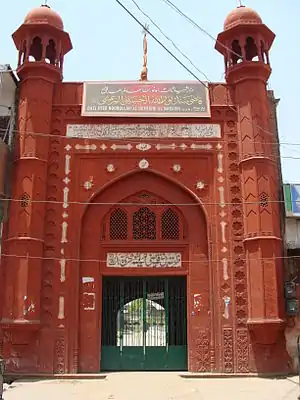Qazi Nurullah Shustari
Qazi Noorullah Shustari (Persian: قاضی نوراﷲ شوشتری, Hindi: क़ाज़ी नूरुल्लाह शुस्तरी) (1542 -1610/11) also known as Shaheed-e-Salis (third martyr) was an eminent Shia faqih (jurist) and alim (scholar) of the Mughal period.[1] He may also have served as the Qazi-ul-Quzaa during the reign of Akbar.[2]

Life
He was born in 956 AH at Shushtar, in present-day Khuzestan, South of Iran. He belonged to the Marashi family in Amol. He moved from Mashhad to India,[3] on 1 Shawwal 992/6 October 1584. Although according to some accounts, the year may have been 1587.[4][5] He was an emissary of Akbar in Kashmir obtained the first census of the areas of Mughal Empire during Akbar's reign.
Death
When Jahangir came to power his position within the court came under threat both from the enemies he had made while settling the disputes in Agra and Kashmir, and from Jahangir's own orthodox stance. Ultimately his own book Ahqaq-ul-haq was presented as evidence against him, he was declared a heretic and sentenced to death due to his religious beliefs.[6][7] He was executed by flogging in Jumada II 1019/September 1610, when he was seventy.[8][9][10]
There is a famous debate shedding light on his assassination in the book Peshawar Nights [11]
Legacy
His tomb at Agra[12] is under waqf deed of Dawood Nori Nasir Bagh. The deed states that a member from the family of Nasirul Millat would be patron of the Mazar.[13]Shushtari wrote approximately fifty books and essays in Islamic sciences like kalam, jurisprudence and sirah. He is considered as one of the scholars who paved the way for the development of Shia Islam.[14]
Works
He wrote many works in different disciplines. some of them are as follow:
- Majalis al-muminin
- Ihqaq Al Haq va Izahaq Al atil
- Commentary on Quran
- a glosses on Tahzib al Ahkam by Shaykh Tusi
- Ilzam Al Naseb.
See also
References
- Shaheed-e-salis. (Open Library)
- The World's Religions -Page 383- by Stewart R. Sutherland – Religion – 1988 -
- A Socio-intellectual History of the Isnā Asharī Shīaīs in India – Page 346 by Saiyid Athar Abbas Rizvi, – 1986 –
- The Shi'a of India-Page 140, By John Norman Hollister-1953
- Majmaʻulafkār – Page 15 by Iqtidar Husain Siddiqi, K̲h̲udā Bak̲h̲sh Oriental Public Library- 1993
- The Empire of the Great Mughals By Annemarie Schimmel, Corinne Attwood, Burzine K. Waghmar page 109
- An introduction to Shi'i Islam: the history and doctrines of Twelver Shi'ism By Moojan Momen, #121.
- A Cultural History of India – Page 290 by Arthur Llewellyn Basham – History – 1975
- Islamic education, diversity and national identity: Dīnī madāris in India ... – Page 107 by Jan-Peter Hartung, Helmut Reifeld – Islamic religious education – 2006 -
- Religion, State, and Society in Medieval India: Collected Works of S. Nurul Hasan- Page 76 by S. Nurul Hasan, Satish Chandra – History – 2005
- https://thepeshawarnights.wordpress.com/2019/10/22/martyrdom-of-shahid-al-thalis/
- Shaheed E Saalis - About - Google
- "Shia ulema at odds over shrine control". Hindustan Times. 9 April 2006. Retrieved 15 January 2013.
- http://lib.eshia.ir/10251/77/8/%D8%AD%D8%AF%DB%8C%D8%AB_%D9%85%D9%86%D8%B2%D9%84%D8%AA
External links
- An Oriental Biographical Dictionary: Founded on material collected by Thomas William Beale New edition revised by Henry George Keene
- Proceedings of the Asiatic Society of Bengal
- Biography: Shaheed-e-Thalith Qazi Nurullah Shustari
- Biography:Qazi Nurullah Shustari -Jafariyanews